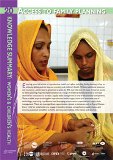
About the Knowlege Summaries
Progress in women’s and children’s health depends on how efficiently knowledge on effective strategies and interventions can be translated into action. PMNCH Knowledge Summaries synthesize the scientific evidence in a short, user-friendly format to inform policy and practice. The Knowledge Summaries bring together information from trusted sources such as journal articles, systematic reviews, technical guidelines, policy documents etc., and each summary is peer-reviewed.
Knowledge Summary 20: Access to Family Planning
Ensuring universal access to reproductive health and rights, including family planning, is key to achieving global goals to improve women’s and children’s health. Without additional attention and resources, unmet need is projected to grow by 40% over the next 15 years. Universal access to family planning requires implementation of a range of evidence-based practices to increase demand for and access to services. Supply chain management is one of the essential components. Three notable ways to strengthen reproductive health supply chains are: innovative use of technology, improving coordination and leveraging private sector experience in supply chain management. There are now signifi cant opportunities related to initiatives such as Every Woman, Every Child for stakeholders to engage in building demand, strengthening supply chains, and ensuring sustained availability to family planning commodities, information and services.
The Challenge
More than 222 million women globally lack access to family planning in 2012. Fulfilling this unmet need for family planning in developing countries would prevent 54 million unintended pregnancies, 26 million abortions, 79,000 maternal deaths and 1.1 million newborn deaths. The unmet need for family planning is anticipated to grow by 40% over the next 15 years. These statistics, coupled with rapidly approaching deadlines for achieving global targets and consensus on essential family planning interventions and related initiatives, have injected a renewed urgency to reach reproductive health targets and raised a call to mobilise unprecedented resources. Increasing access to and use of family planning depends on a range of best practices. Notable innovations and resources that have been critically acclaimed for family planning include the cornerstone WHO publication providing guidance on medical eligibility criteria for contraceptive use and the associated wheel that helps family planning providers apply these criteria. Here we focus on supply chain management and highlight three best practices in this area:
- ? Innovations in using technology
- ? Strengthening coordination mechanisms
- ? Applying private sector best practices
Access to family planning requires having a well functioning supply chain, hence the adage “no product, no programme”. The conceptual framework was adapted to the family planning context and incorporates a common refrain heard among logisticians known as the “Six Rights.” Historically, there were limited supply chain strengthening efforts in developing low-income countries and those that existed focused on strengthening procurement to avoid stockouts at the Central Medical Stores. It is increasingly recognised that in order to provide continuously available commodities to end users, the supply chain must be strengthened at all levels—particularly in the last mile of the health system.